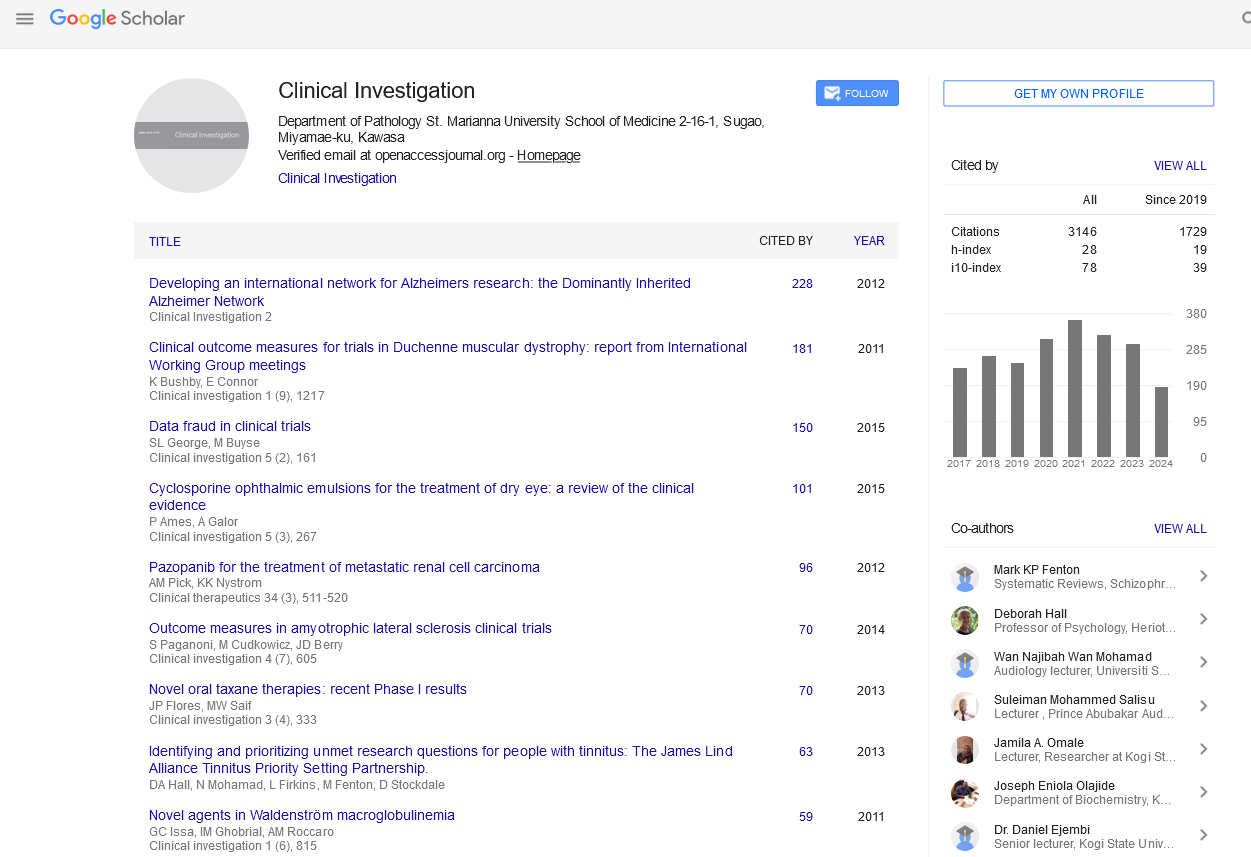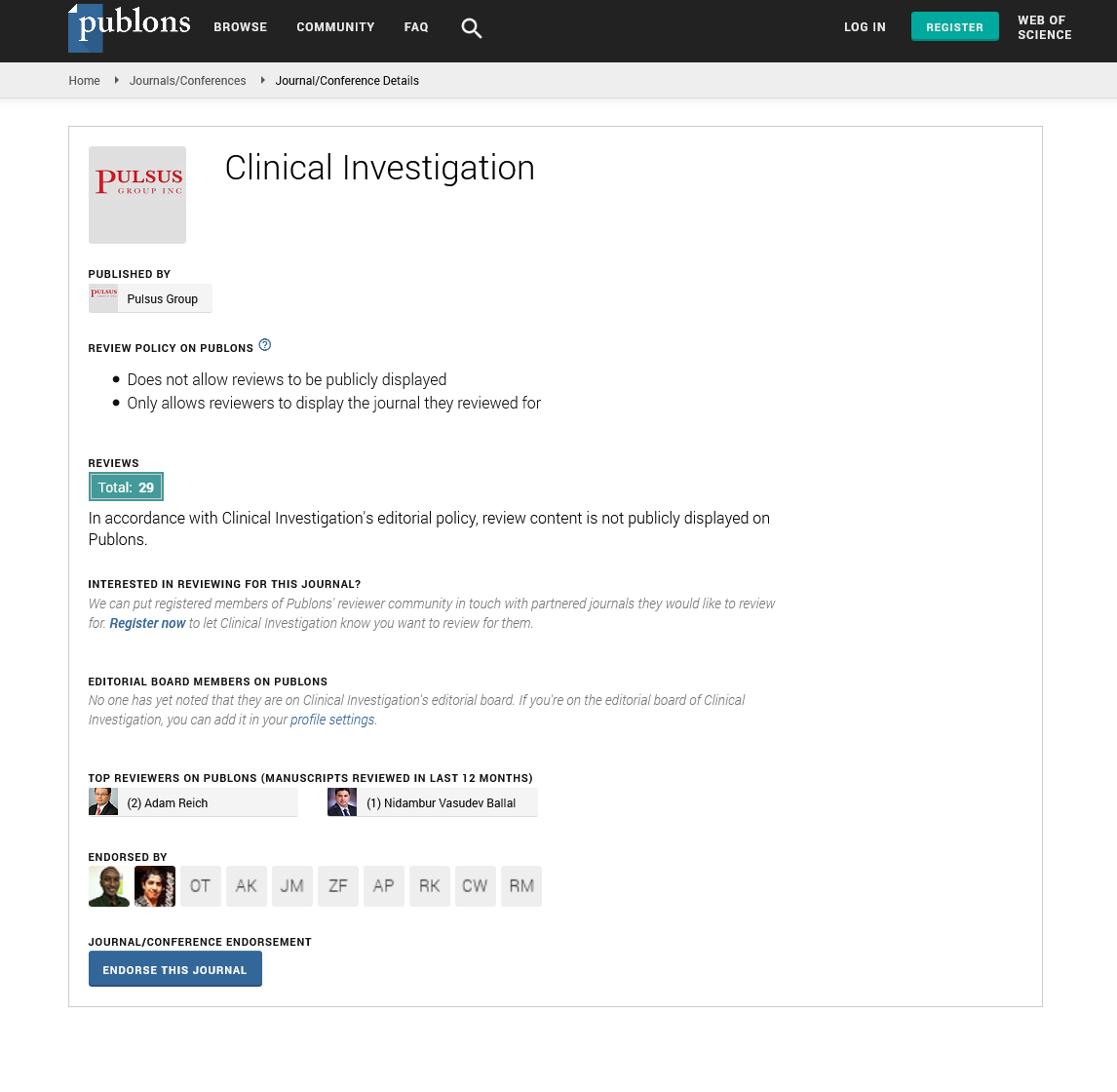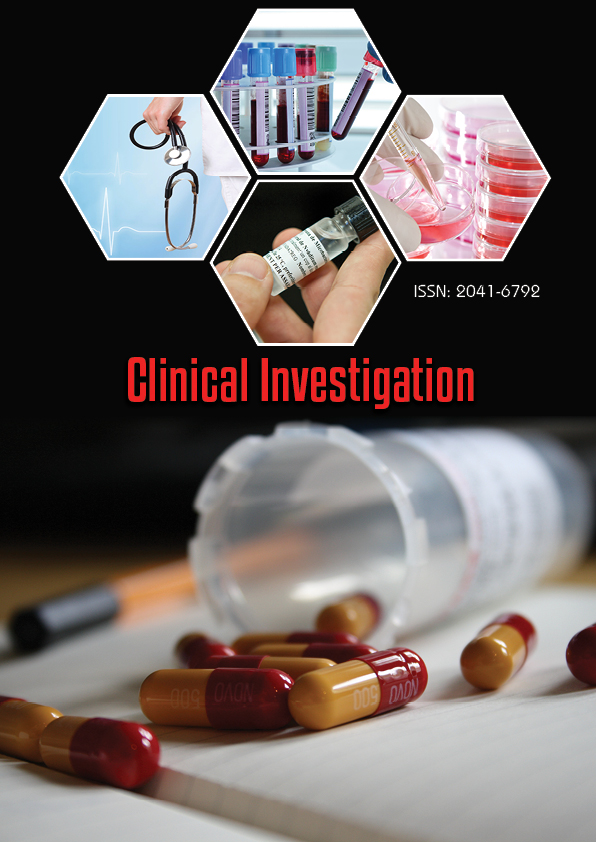Editorial - Clinical Investigation (2021) Volume 11, Issue 10
Treatment of depression in cancer patients with anti-depressants
- Corresponding Author:
- Erica Bronen
Editorial Office, Clinical Investigation, London, UK
E-mail: clinicalinvestigation313@gmail.com
Submitted: 30 September 2021; Accepted: 14 October 2021; Published: 21 October 2021
Abstract
People with cancer are more likely to suffer from major depression and other depressive disorders. Due to the overlap between medical and psychiatric symptoms specified by diagnostic guides such as the Diagnostic and Statistical Manual of Mental Disorders (DSM) and the International Classification of Diseases (ICD), these illnesses are difficult to detect in clinical practise. Furthermore, distinguishing between pathological and typical reactions to such a severe sickness is very difficult. Even in subthreshold manifestations, depressive symptoms have been found to have a negative impact on quality of life, adherence to anticancer therapy, suicide risk, and perhaps even the cancer’s death rate. There are few RCTs on the efficacy, tolerability, and acceptability of antidepressants in this population, and the results are typically contradictory. Cancer patients frequently experience depressive episodes. Depressive symptoms are frequently a natural response to or a direct result of such a serious and life-threatening illness. As a result, determining when depressed symptoms have progressed to the point where they require medication is difficult. Depressive symptoms, even when minor, can have a significant impact on the course of cancer, decreasing people’s overall quality of life and impairing their compliance with anticancer therapy, as well as perhaps raising the risk of death, according to current scientific literature.
Editorial
People with cancer are more likely to suffer from major depression and other depressive disorders. Due to the overlap between medical and psychiatric symptoms specified by diagnostic guides such as the Diagnostic and Statistical Manual of Mental Disorders (DSM) and the International Classification of Diseases (ICD), these illnesses are difficult to detect in clinical practise. Furthermore, distinguishing between pathological and typical reactions to such a severe sickness is very difficult. Even in subthreshold manifestations, depressive symptoms have been found to have a negative impact on quality of life, adherence to anticancer therapy, suicide risk, and perhaps even the cancer’s death rate. There are few RCTs on the efficacy, tolerability, and acceptability of antidepressants in this population, and the results are typically contradictory. Cancer patients frequently experience depressive episodes. Depressive symptoms are frequently a natural response to or a direct result of such a serious and life-threatening illness. As a result, determining when depressed symptoms have progressed to the point where they require medication is difficult. Depressive symptoms, even when minor, can have a significant impact on the course of cancer, decreasing people’s overall quality of life and impairing their compliance with anticancer therapy, as well as perhaps raising the risk of death, according to current scientific literature.
Antidepressants should be evaluated for their potential benefits in individuals with cancer (aged 18 and over). The goal of this study is to determine the efficacy and acceptability of antidepressants in the treatment of depressed symptoms in cancer patients of all types and stages.
Antidepressants are a diverse group of medications with no discernible mechanism of action. According to the widely established notion of monoamine dysregulation as the primary neurophysiological event underlying mood disorders, their therapeutic impact may be related to their ability to influence serotonin, norepinephrine, and dopamine neurotransmission systems. Alternative pathways have emerged in recent years, revealing the complexity of interactions between multiple systems that these medications rely on. For example, current antidepressant drug research focuses on modulating glutamate and melatonin transmission, neural proliferation and plasticity in limbic areas, endocrine system activities (particularly the hypothalamicpituitaryadrenal axis), antioxidant, anti-inflammatory, and immunologic pathways, as well as antioxidant, anti-inflammatory, and immunologic pathways.
The extent to which any of these factors can contribute to the dysregulation of the brain’s homeostatic system varies greatly between people and is influenced by a variety of biological, environmental, and psychological factors. As a result, even though antidepressant efficacy has been demonstrated in some types of depressive illnesses, we cannot assume that these results are reliable in the same way for persons with cancer, for whom various additional elements may play a role in the pathogenesis (including psychological, immunologic and metabolic factors, as well as pain and highly distressing treatments).
Antidepressants may have a favourable effect in cancer biology, according to some scientists. However, these findings are preliminary and need to be confirmed; it’s also unclear whether the effect of antidepressants varies depending on the type of cancer, the location of the tumour, or both. There have been few systematic reviews of this topic, with only a small number of papers from which to make conclusions.
In most situations, antidepressant doses should be gradually increased, and medication may take several weeks to take effect. Antidepressants may need to be adjusted over time to ensure that the correct dose is administered. Furthermore, it has been stated that compliance is an important role in the efficacy of antidepressants.

